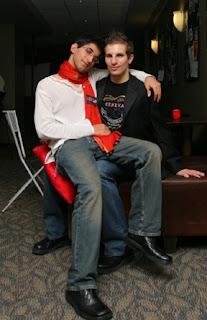 About three-quarters (72%) of truck drivers in North Pakistan who participated in a recent survey published in AIDS Analysis Asia admitted that they has sex with other males, while 76% stated that they had sex with female sex workers. Are these 72% gay? Homosexual? There is sufficient anecdotal evidence to indicate that in the other countries of the sub-continent, similar levels of male to male sexual behaviors exist as part of a broader sexual repertoire. Are these males bisexual?
About three-quarters (72%) of truck drivers in North Pakistan who participated in a recent survey published in AIDS Analysis Asia admitted that they has sex with other males, while 76% stated that they had sex with female sex workers. Are these 72% gay? Homosexual? There is sufficient anecdotal evidence to indicate that in the other countries of the sub-continent, similar levels of male to male sexual behaviors exist as part of a broader sexual repertoire. Are these males bisexual?In working with sexual health issues in India and in listening to the rhetoric of UNAIDS representatives, international donor agencies, the Indian medical profession, and many Western and Indian gay men, an assumption is often made that same-gender sexual behaviors must mean the person is a homosexual, or gay, while male to female sexual behavior must mean that the person is heterosexual.
In these discourses, procreative "heterosexuality" is seen as 'normal." While other behaviors are seen as perverse or foreign. However, these constructs seem to have little contemporary or historical validity in India (and even to some extent in the West). This reductionist ideology is a recent invention from the 19th century, which has consequently acted to reduce the rich diversity of alternate sexualities (Foucault, 1978; Weeks, 1986; Katz, 1995, Herdt, 1994).
Closer analysis of these debates seems to me to indicate a confusion among the terms sexual behavior, gender, identity formation, and cross-cultural validity, and within such confusion there may well be elements of neo-colonialism, racism, and Western imperialism.
I was interested to hear Dede Oetomo, a gay activist in Indonesia, say at the Vancouver International AIDS Conference in July 1996 that perhaps "importing" Western constructions of gay identities into Indonesia was creating a social tension whereby local homo-affectionalist and homo-social structures were being destroyed for the fear of being labeled "gay."
The debate on sexualities may even at times be perceived as a form of neo-colonialism whereby Western sexual ideologies have "invaded" Indian discourses on sexuality and identity by professionals, laypersons, "straights" or "gays," and whereby indigenous histories and cultures become invisible.
Much same-sex sexual behavior involves non-penetrative varieties, mutually indulged in frameworks of friendships and sexual play, while in other situations urgent sexual discharge and sexual "need" is the significant factor.
However, the denial of variation in history in many Western and Indian discourses had given rise to a prevailing construction of sexuality, where a "procreative and penetrative" sexual ideology is the only "sexuality" that is seen as relevant. Perversely, any other form is categorized as deviant and Western.
[Source from; globalgayz.com]
